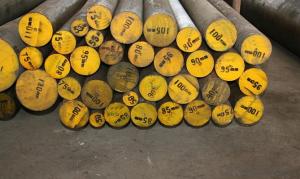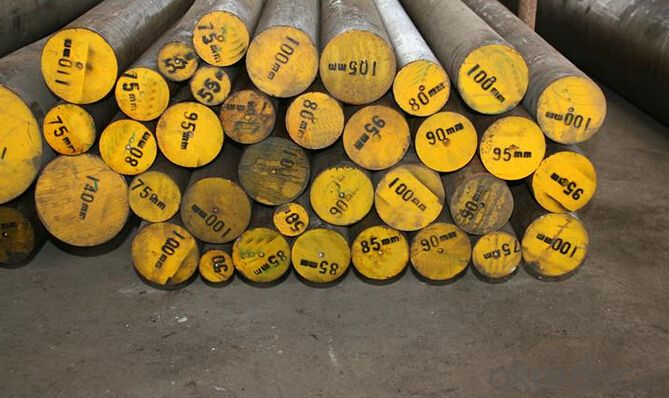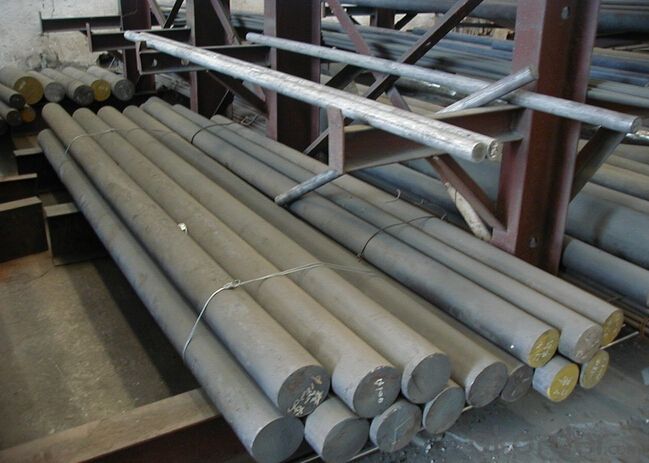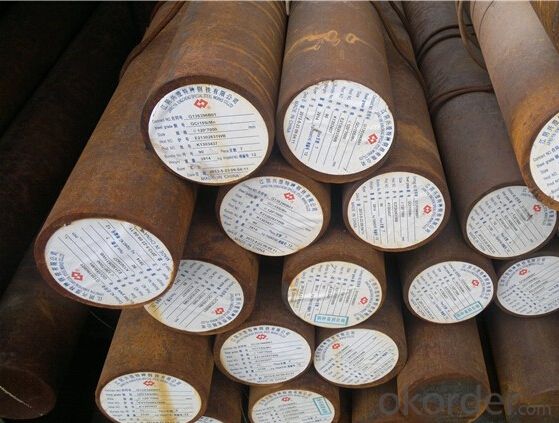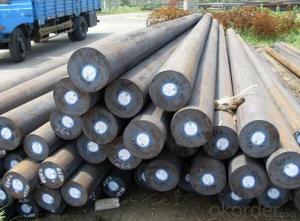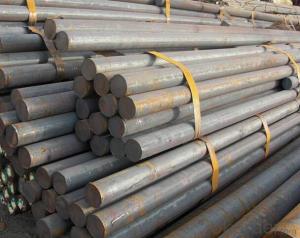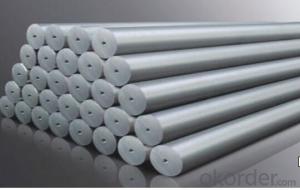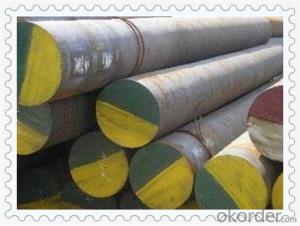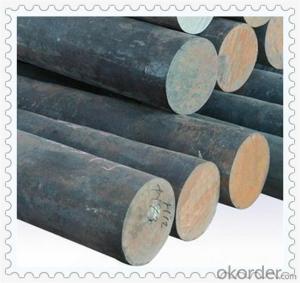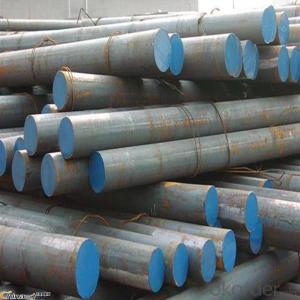Hot Rolled Steel Bar AISI 4140 Steel Bar
- Loading Port:
- China main port
- Payment Terms:
- TT OR LC
- Min Order Qty:
- 30 m.t.
- Supply Capability:
- 10000 m.t./month
OKorder Service Pledge
OKorder Financial Service
You Might Also Like
Specification
Hot Rolled Steel Bar AISI 4140 Steel Bar
Product Information:
1:hot rolled steel bar 4140/ SCM440/4130/1045
2:size:20-250mm
3: length:5.8-6m,black surface
4:high quality,competitive price
Product Overviews:
| Product Name | Typical Grades | Diameter(mm) | Standard adopted |
| Carbon Steel | 20 (1020/S20C/C22) | Ø16-Ø300 | GB/SAE/JIS/DIN |
| 40 (1040/S40C/C40) | |||
| 45 (1045/S45C/C45) | |||
| Bearing Steel | GCr9 (51100/SUJ1) | Ø12-Ø250 | |
| GCr15 (52100/SUJ2/100Gr6) | |||
| GCr9SiMn (A485-Gr.1/SUJ3) | |||
| Cr-Mo Steel | 20Cr (5120/SCr420H/20Cr4) | Ø12-Ø250 | |
| 40Cr (5140/SCr440/41Cr4) | |||
| 42CrMo(4140/SCM440/42CrMo4) | |||
| Gear Steel | 20CrNiMo | Ø16-Ø600 | |
| 20CrMn(5115/SMnC420/20MnCr5) | |||
| 20CrNiMo(8620/SNCM220/20CrMiMo2) |
Product Show:

Our Advantages:
· Industry experience over 20 years.
· Shipment of goods -More than 70 countries worldwide.
· The most convenient transport and prompt delivery.
· Competitive price with best service.
· High technical production line with top quality products.
· High reputation based on best quality products.
With our experienced, enthusiastic and dynamic staffs, we assure to bring you the products with best quality, reasonable prices and good after-sales services under the motto: Friends First, Business After.
Communication, Experience, Expertise and Best efforts are our Promises to you.
- Q: What are the different shapes and forms in which special steel is available?
- Various shapes and forms of special steel are available to satisfy the diverse industrial and engineering needs. Some examples of special steel include: 1. Bars: Bars of special steel find extensive usage in the construction, automotive, and machinery sectors. They come in round, square, hexagonal, and flat shapes, providing design flexibility and ease of machining. 2. Sheets and Plates: Special steel sheets and plates are utilized in the production of robust components and structures. These sheets and plates are obtainable in different sizes and thicknesses, ensuring suitability for a wide range of applications. 3. Tubes and Pipes: Special steel tubes and pipes are commonly employed in industries like oil and gas, construction, and automotive. These tubes and pipes are available in various dimensions and can be either seamless or welded to meet specific requirements. 4. Wire: Special steel wire is extensively used for manufacturing springs, cables, fasteners, and other products that demand high tensile strength and corrosion resistance. It is available in different diameters and can undergo further processing techniques like drawing or annealing. 5. Forgings: Special steel can also be acquired in the form of forgings, which are shaped through controlled heating and mechanical pressure. Forgings possess exceptional strength and toughness, making them ideal for critical components in aerospace, power generation, and heavy machinery industries. 6. Castings: Special steel castings are produced by melting the steel and pouring it into molds. This casting process allows for the creation of intricate shapes and details, rendering castings suitable for applications in the automotive, energy, and mining sectors. 7. Profiles: Special steel profiles are tailor-made shapes that are specifically designed to fulfill unique engineering requirements. These profiles can be extruded, rolled, or cold-drawn, and are widely utilized in construction, transportation, and manufacturing industries. These examples merely scratch the surface of the diverse range of shapes and forms in which special steel is available. The selection of the most appropriate shape and form depends on the specific application and the desired mechanical properties required for the final product.
- Q: How does special steel contribute to the energy storage sector?
- Special steel contributes to the energy storage sector by providing crucial components for the construction of various energy storage systems. For instance, it is used in the manufacturing of high-performance batteries, such as lithium-ion batteries, which are widely utilized in electric vehicles and renewable energy storage solutions. The exceptional strength, durability, and corrosion resistance properties of special steel make it ideal for ensuring the longevity and efficiency of these energy storage technologies. Additionally, special steel is also employed in the construction of infrastructure such as storage tanks and pipelines, which are essential for the transportation and distribution of energy resources. Overall, special steel plays a pivotal role in enhancing the reliability and performance of energy storage systems, thereby facilitating the transition towards a more sustainable and efficient energy future.
- Q: How is special steel used in the construction manufacturing process?
- Special steel is commonly used in the construction manufacturing process due to its unique properties such as high strength, durability, and resistance to corrosion. It is used for various applications, including structural components, reinforcement bars, and fasteners. Special steel enhances the overall structural integrity of buildings, bridges, and other construction projects, ensuring their longevity and safety.
- Q: What are the machining techniques for special steel?
- Some of the machining techniques commonly used for special steel include milling, turning, drilling, grinding, and broaching. These techniques are employed to shape and finish the special steel material according to the desired specifications and requirements. Additionally, special attention is given to selecting appropriate cutting tools, speeds, and feeds to ensure efficient and precise machining.
- Q: How does special steel contribute to the pharmaceutical aftermarket industry?
- The pharmaceutical aftermarket industry greatly relies on special steel, which offers numerous benefits that enhance the efficiency and quality of pharmaceutical products. Firstly, special steel's resistance to corrosion and wear makes it ideal for manufacturing pharmaceutical equipment like tanks, vessels, and pipelines. This resistance guarantees the equipment's integrity and prevents any contamination of pharmaceutical products. Furthermore, special steel possesses outstanding heat resistance, enabling it to withstand high temperatures without deformation or degradation. This is especially crucial in pharmaceutical manufacturing processes involving heat, such as sterilization or drying. Special steel's heat resistance ensures the equipment remains stable and reliable, ensuring the safety and effectiveness of pharmaceutical products. Moreover, special steel is renowned for its strength and durability, making it capable of enduring rigorous usage in the pharmaceutical industry. This is vital in the aftermarket industry, where pharmaceutical equipment often undergoes frequent repairs or modifications. The strength and durability of special steel facilitate easy maintenance and repair, reducing downtime and costs for pharmaceutical companies. Additionally, special steel offers excellent hygiene properties, as it can be easily cleaned and sanitized. This is of utmost importance in the pharmaceutical industry, where stringent hygiene standards are crucial to prevent contamination or cross-contamination of pharmaceutical products. Special steel's ease of cleaning and sanitization ensures the equipment remains free from potential sources of contamination, thereby preserving the integrity and quality of the products. In summary, special steel significantly contributes to the pharmaceutical aftermarket industry by providing corrosion resistance, heat resistance, strength, durability, and excellent hygiene properties. These characteristics ensure the integrity, safety, and effectiveness of pharmaceutical products, while also minimizing maintenance costs and downtime for pharmaceutical companies. Thus, special steel plays a pivotal role in the overall efficiency and success of the pharmaceutical aftermarket industry.
- Q: What are the different methods of surface protection for special steel?
- Different methods of surface protection for special steel offer unique benefits and are suitable for specific applications. Some commonly used methods are: 1. Galvanization: Zinc coating is applied to the steel, providing excellent corrosion resistance. Hot-dip galvanization or electroplating can be used depending on the requirements. 2. Paint coating: A paint coating is applied to protect the steel from corrosion and environmental factors. The paint acts as a barrier, preventing rust and damage. 3. Powder coating: Dry powder is applied to the steel surface and heated to create a protective layer. This method offers excellent resistance to corrosion, chemicals, and abrasion, making it ideal for harsh conditions. 4. Electroplating: A layer of metal is deposited onto the steel surface through an electrochemical process. This enhances corrosion resistance and may provide additional benefits such as increased hardness or improved aesthetics. 5. Thermal spraying: Material like zinc or aluminum is melted or heated and sprayed onto the steel surface to form a protective coating. Thermal spraying offers excellent corrosion protection and can be used for surface repairs. 6. Ceramic coating: Ceramic coatings are highly resistant to corrosion, abrasion, and high temperatures. They are commonly used in extreme conditions such as the aerospace or automotive industries. 7. Passivation: Chemical process removes free iron and contaminants from the surface of stainless steel. This improves corrosion resistance by forming a passive oxide layer. Choosing the appropriate surface protection method depends on the specific requirements of the steel and its application. Factors such as desired corrosion resistance level, environmental conditions, and desired lifespan should be considered when selecting a method.
- Q: What are the main characteristics of heat-resistant steel?
- Heat-resistant steel, also known as high-temperature steel, is a type of alloy that possesses specific properties that enable it to withstand extreme temperatures without losing its mechanical strength and integrity. The main characteristics of heat-resistant steel include: 1. High resistance to thermal fatigue: Heat-resistant steel is designed to withstand cyclic heating and cooling without developing cracks or fractures. This property allows it to maintain its structural integrity even in environments with rapid temperature fluctuations. 2. Excellent creep resistance: Creep is the gradual deformation that occurs in a material when it is exposed to high temperatures over an extended period. Heat-resistant steel exhibits exceptional resistance to creep, ensuring that it retains its shape and strength even under prolonged heat exposure. 3. Retention of mechanical properties at elevated temperatures: Unlike regular steel, which can experience a significant reduction in strength and hardness at high temperatures, heat-resistant steel retains its mechanical properties even at extreme temperatures. This characteristic makes it suitable for applications in industries such as aerospace, power generation, and oil and gas. 4. Oxidation and corrosion resistance: Heat-resistant steel is highly resistant to oxidation and corrosion at elevated temperatures. It forms a protective oxide layer on its surface, preventing the underlying material from being attacked by oxygen or other corrosive elements. This property enhances the longevity and reliability of components made from heat-resistant steel. 5. High thermal conductivity: Heat-resistant steel possesses excellent thermal conductivity, allowing it to efficiently transfer heat away from its surface. This feature is particularly beneficial in applications where heat dissipation is critical, such as in heat exchangers and furnace components. 6. Low thermal expansion: Heat-resistant steel has a relatively low coefficient of thermal expansion, meaning it expands and contracts minimally when subjected to temperature changes. This characteristic ensures dimensional stability and reduces the risk of warping or distortion under thermal stress. Overall, the main characteristics of heat-resistant steel make it an ideal material for applications that involve exposure to high temperatures, such as furnace components, exhaust systems, gas turbines, and heat exchangers. Its ability to withstand extreme heat without compromising its structural integrity and mechanical properties make it a crucial material in industries where temperature resistance is paramount.
- Q: What are the different methods of surface coating for special steel?
- There are several different methods of surface coating that can be used for special steel, depending on the desired outcome and application. Some of the most common methods include: 1. Electroplating: This method involves using an electric current to deposit a thin layer of metal onto the surface of the steel. This can improve the steel's corrosion resistance, wear resistance, and aesthetic appearance. 2. Hot-dip galvanizing: In this method, the steel is immersed in a bath of molten zinc, which forms a protective coating on the surface. Hot-dip galvanizing provides excellent corrosion protection and can be used for both interior and exterior applications. 3. Powder coating: Powder coating involves applying a dry powder to the steel surface, which is then heated and cured to form a durable and attractive coating. Powder coating can provide excellent corrosion resistance, impact resistance, and color customization options. 4. Physical vapor deposition (PVD): PVD is a vacuum coating process that involves depositing thin layers of metal onto the steel surface. This method can improve the steel's hardness, wear resistance, and chemical resistance. It is commonly used for decorative finishes and to enhance the performance of cutting tools. 5. Chemical conversion coating: This method involves treating the steel surface with a chemical solution, which reacts with the surface to form a protective coating. Chemical conversion coatings can provide corrosion resistance and can also be used as a base for painting or other coatings. 6. Thermal spraying: Thermal spraying involves melting or heating a coating material and projecting it onto the steel surface using a spray gun. This method can be used to apply a wide range of coatings, including metals, ceramics, and polymers. Thermal spraying can improve the steel's wear resistance, corrosion resistance, and thermal insulation properties. These are just a few examples of the different methods of surface coating for special steel. The choice of method will depend on factors such as the desired properties, application requirements, and budget. It is important to consult with experts in the field to determine the most suitable coating method for specific steel applications.
- Q: What are the properties of high-speed stainless steel?
- High-speed stainless steel is characterized by its excellent hardness, wear resistance, and heat resistance. It also exhibits high corrosion resistance, good dimensional stability, and excellent machinability. Additionally, high-speed stainless steel retains its properties even at elevated temperatures, making it suitable for applications requiring high cutting speeds and prolonged tool life.
- Q: Can special steel be used in the manufacturing of precision instruments?
- Indeed, precision instruments can benefit from the utilization of special steel. Special steel encompasses a range of steel types that have been purposefully crafted and processed to possess specific attributes, such as heightened strength, hardness, resistance to corrosion, and thermal stability. These unique qualities render special steel highly suitable for applications necessitating precision and accuracy, such as precision instrument manufacturing. Precision instruments, such as surgical tools, measuring devices, optical instruments, and scientific equipment, necessitate materials capable of retaining dimensional stability and enduring extreme conditions. Special steels, such as stainless steel, tool steel, and high-speed steel, provide exceptional mechanical properties, including remarkable tensile strength, resistance to wear, and dimensional stability. Consequently, these kinds of steel are well-suited for the production of precision instruments. Moreover, special steel can be engineered to possess specific characteristics, such as low magnetic permeability or excellent resistance to temperature fluctuations. These attributes prove particularly vital in precision instruments, as magnetic interference or temperature variations have the potential to impact their performance. To summarize, special steel can indeed be employed in the manufacturing of precision instruments due to its exceptional mechanical properties, dimensional stability, and ability to withstand harsh conditions. Its versatility enables the production of precision instruments of superior quality, fulfilling the stringent requirements of various industries, including the medical, scientific, and engineering sectors.
Send your message to us
Hot Rolled Steel Bar AISI 4140 Steel Bar
- Loading Port:
- China main port
- Payment Terms:
- TT OR LC
- Min Order Qty:
- 30 m.t.
- Supply Capability:
- 10000 m.t./month
OKorder Service Pledge
OKorder Financial Service
Similar products
Hot products
Hot Searches
Related keywords
